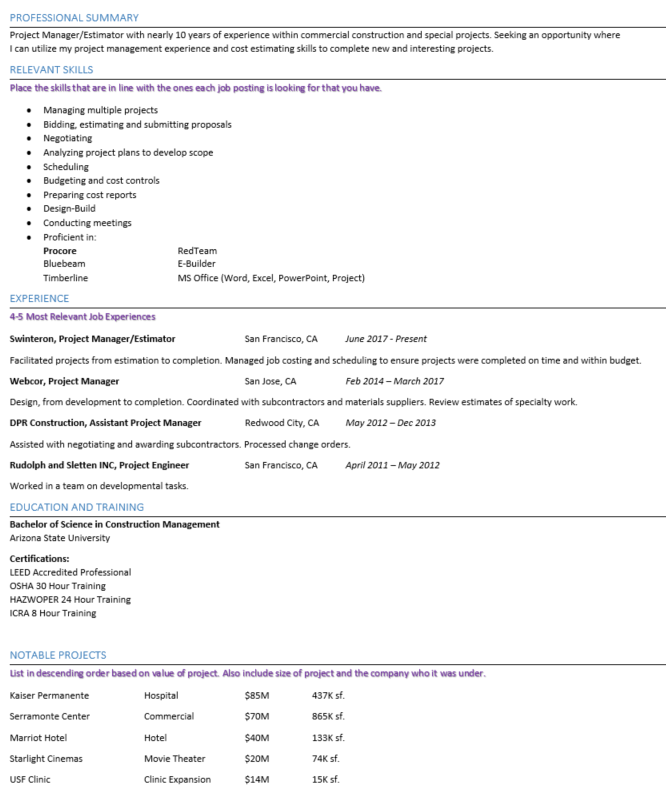Construction experience can be a tricky thing to break down and present on a single page resume, especially if you have a lot of experience. Learning how to simplify your resume and pull out the most important information is a must at any point in your career. A resume is your chance to make a great first impression and let hiring managers know why they should hire you for their next project.
We worked with our recruiters to gather some helpful tips to spruce up your resume and get your dream job!
Your Projects
This is the most important section for Construction hiring managers. Do it right and you’ll increase your odds of you getting an interview and offer.
There are four things you should include in each project:
- Project name / Who the client is
- How much the project is worth
- How many square feet the project is
- What type of construction the project is
- New Construction vs. Tenant Improvement, Renovation/Remodeling
- Commercial, Single or Multi Family Residential, Office, Hotel, School, Hospital, etc.
It’s easy to over explain your projects and get lost in the details of every single one. Don’t put unnecessary or redundant information within each listing. Remember, you are talking to an industry professional who knows the jargon.
Your Most Relevant Skills and Experience
Every company and job posting is different. Two companies could be searching for the same job title, but those companies will be looking for candidates with a totally different set of skills and experience. For example, if you’re applying for a role at a commercial construction company, they’re probably not going to be as interested in your single-family residential work. Multi-family might still be applicable depending on the company’s needs, but you’ll be better off front-loading your resume with your commercial experience rather than residential unless you know multi-family experience is something they’re looking for.
Here are five things you should include in the skills and experience section:
- Who you worked for – Important so the hiring manager can tell if you have more experience working for GCs or Subs
- What your title was
- When you were at the company – Include month and year.
- Where the company was located – Include city and state.
- What you did for the project – Include your most important duties and responsibilities. Did you hire and manage scheduling? Did you estimate costs? Were you in charge of negotiating and awarding subcontracts? Were you on-site everyday overseeing the actual construction? This section can become lengthy, so try to summarize your key responsibilities in one or two lines max!
Recruiters and employers will call you if they need more detailed information. Also, your title and the project size will give the recruiter or employer enough information to go off of. For example, larger projects of $100M+ usually include 1-2 other Superintendents. So typically, if your title doesn’t include “Sr. or General”, then the hiring manager can reasonably assume you were not the lead and that you were in charge of the scope vs. the entire project.
Identify your accomplishments in this section and make sure you mention any applicable key skills you think are relevant for each job posting. That being said, details are good but there is a fine line between necessary information and putting your potential employer to sleep. If you think something is redundant, it most likely is.
We recommend summarizing your experience in each job in one or two lines and bullet pointing all your skills in a separate section of your resume. You can list software skills in this section as well. If you know the position requires knowledge of a certain one, bold that software in the list so it stands out. For example, you might want to include a line that says, “Familiar with Procore, Primavera, Timberline and Bluebeam”. It’s good to include specialties in this section like demolition, land grading, landscaping or utilities for example.
Your Education, Certifications and Training
You may be thinking, at a certain point in your career, it’s almost given that you’ll have certain certs under your belt. It’s a safe bet that anyone working in construction for 10 years has some form of OSHA certification for example. Why do I need to list my certs? Recruiters and hiring managers may vet candidates on whether or not they have certain certifications on their resume. It’s helpful to list all your certifications to cover all your bases – OSHA, HAZWOPER, ICRA, LEED, etc.
If you’re a Civil or Structural Engineer, you’ll definitely want to include your licenses and the states you have them in. Licensing can vary from state to state. Some states in the US have reciprocity so if you have a license in one state, they will acknowledge it in another state. There are a few states that do not offer reciprocity because there are more considerations that need to be taken into account when building in those states. For instance, California, Washington and Oregon have additional seismic regulations that a licensed PE/SE would need to know about. You can include this information in your professional summary or in a certifications and training section of your resume. All you need is a line that says, “Licensed PE in the state of Nebraska” or “Licensed SE in the state of California”.
Additional Suggestions Offered by Our Expert Recruiters
- In the Project Section you might want to include Project Location. This allows hiring managers to determine if they have traveled before and are willing to travel in the future.
- No need to go back further than 15 years on experience unless the position is for senior management
- If you do redact early experience, include a line at the bottom: “Resume shortened for brevity. Early work experience included commercial construction, TI, etc.”
- Specify which positions were contract jobs to avoid looking like a disloyal employee
- For positions that lasted less than 1 year, it’s helpful to include a brief description of why you left. For example, the company dissolved division, laid off due to slow project pipeline or company was acquired.
Here’s an ExampleAfter you finish putting your entire life on paper, don’t forget to review, edit, review, and edit again. Become your own version of a perfectionist. Your resume is the first impression a recruiter or hiring manager will have of you, make it a good one!
Here’s an example of a well-formatted construction resume for all of the visual learners out there. Good luck, and go out and GET THAT JOB!

*This is not real resume. For example use only*













